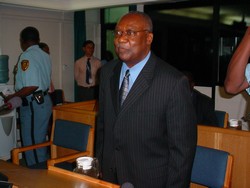
Kigali: The Rwandan government has protested the early release of Colonel Aloys Simba convicted by the International Criminal Tribunal of Rwanda (ICTR) for a 25-year prison term for his role in the 1994 Genocide against the Tutsi.
A released statement reads as follows;
In the strongest terms possible, Rwanda opposes the early release of Aloys Simba from prison. The International Criminal Tribunal of Rwanda convicted Simba of genocide and the crime against humanity of extermination, and it sentenced him to 25 years imprisonment. He should serve his entire prison term.
At a meeting between the Rwandan Ambassador to the United Nations and Judge Theodor Meron, President of the International Residual Mechanism for Criminal Tribunals, on the 14 December 2018, the Government of Rwanda learned that Judge Meron is planning on releasing Aloys Simba from prison. This unilateral action by Judge Meron comes over the objections of the Government of Rwanda and despite the dire consequences of Simba’s release for the survivors of his crimes, his lack of remorse, and his failure to cooperate with authorities.
In the midst of the 1994 Genocide against the Tutsi, Aloys Simba converted what should have been places of refuge into human slaughterhouses. At Kaduha Parish, Simba put traditional weapons, guns, and grenades into the hands of mass murderers and ordered them to “get rid of this filth.” Simba likewise handed out weapons to militias surrounding the Murambi Technical School and instructed them to massacre the thousands of Tutsi civilians seeking shelter there.
One might legitimately question whether the deliberate massacre of more than 1,000 innocent civilians is adequately punished by a term of 25 years imprisonment – in other words, whether imprisonment for three months or less for each helpless victim adequately reflects the severity of the crime. But Judge Meron somehow believes that greater leniency is due and has decided to set Simba free eight years before the end of his sentence.
Under these dire circumstances, inasmuch as Judge Meron is ordering Simba’s release subject to conditions, such as a prohibition on genocide denial, the Mechanism should release him to Rwanda to help ensure compliance with these conditions and to help advance his demobilization and integration, as has been the case for countless individuals in Rwanda.
Under Judge Meron’s presidency, Rwanda and the world have watched as he reversed convictions, reduced sentences, and released criminals long before they served their duly imposed prison terms. His plan to release Simba is not the result of a statutory requirement or the facts. Rather, Judge Meron alone has created an arbitrary and automatic rule, not required by statute and unburdened by individualised considerations and assessments, to release any prisoner after service of two-thirds of the sentence. That is not justice.
As a matter of international law, the Mechanism must take into account the gravity of the offense, the interests of the victim survivors, the prisoner’s demonstration of repentance and rehabilitation, and his cooperation with the prosecution. Simba orchestrated the brutal massacre of his victims in order to advance the genocidal destruction of an entire group. In its submission to the Mechanism, Rwanda provided a detailed opinion from an expert in the trauma of genocide victims, who personally interviewed some survivors and reviewed statements from others. She described how Simba’s release would cause untold trauma for survivors of Kaduha Parish and the Murambi Technical School, where children saw their parents murdered, and parents saw their children murdered.
In the face of this devastation, Simba has shown no remorse and has not cooperated, in any way, with investigators and prosecutors.
We urge the next President to take more seriously the law and the facts, when reviewing applications for early release. With due consideration to appropriate and established legal and factual considerations, the Mechanism can review and act upon an application for release prior to completion of the sentence. But such decisions must be viewed as the exception, reserved for special cases and backed by compelling justifications.
International law does not confer unfettered discretion to the Mechanism or its President. He is not at liberty to undermine what was found and upheld by courts of law, following multi-year investigations and months-long prosecutions, where the sentence captured the fullness of the events and considered all relevant arguments. Going forward, the United Nations, member states, and those who have agreed to these processes must understand that Judge Meron’s approach threatens to undermine the international criminal justice system. (End)
